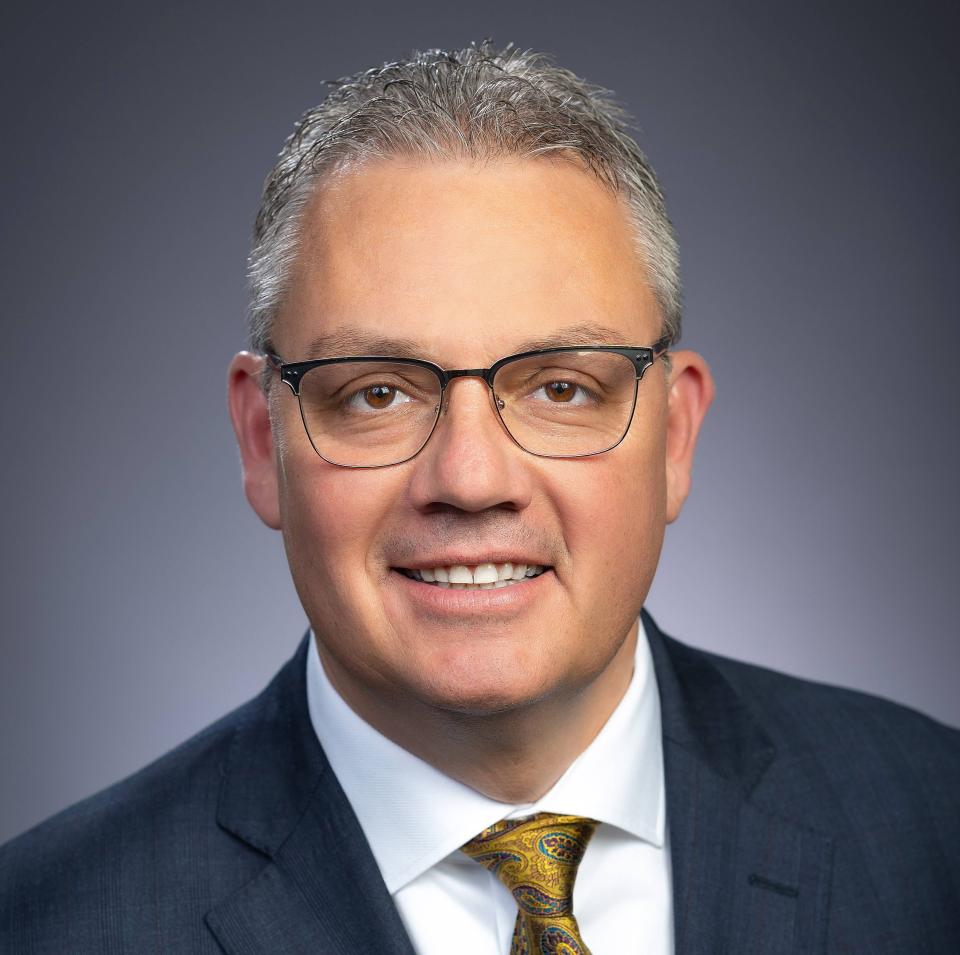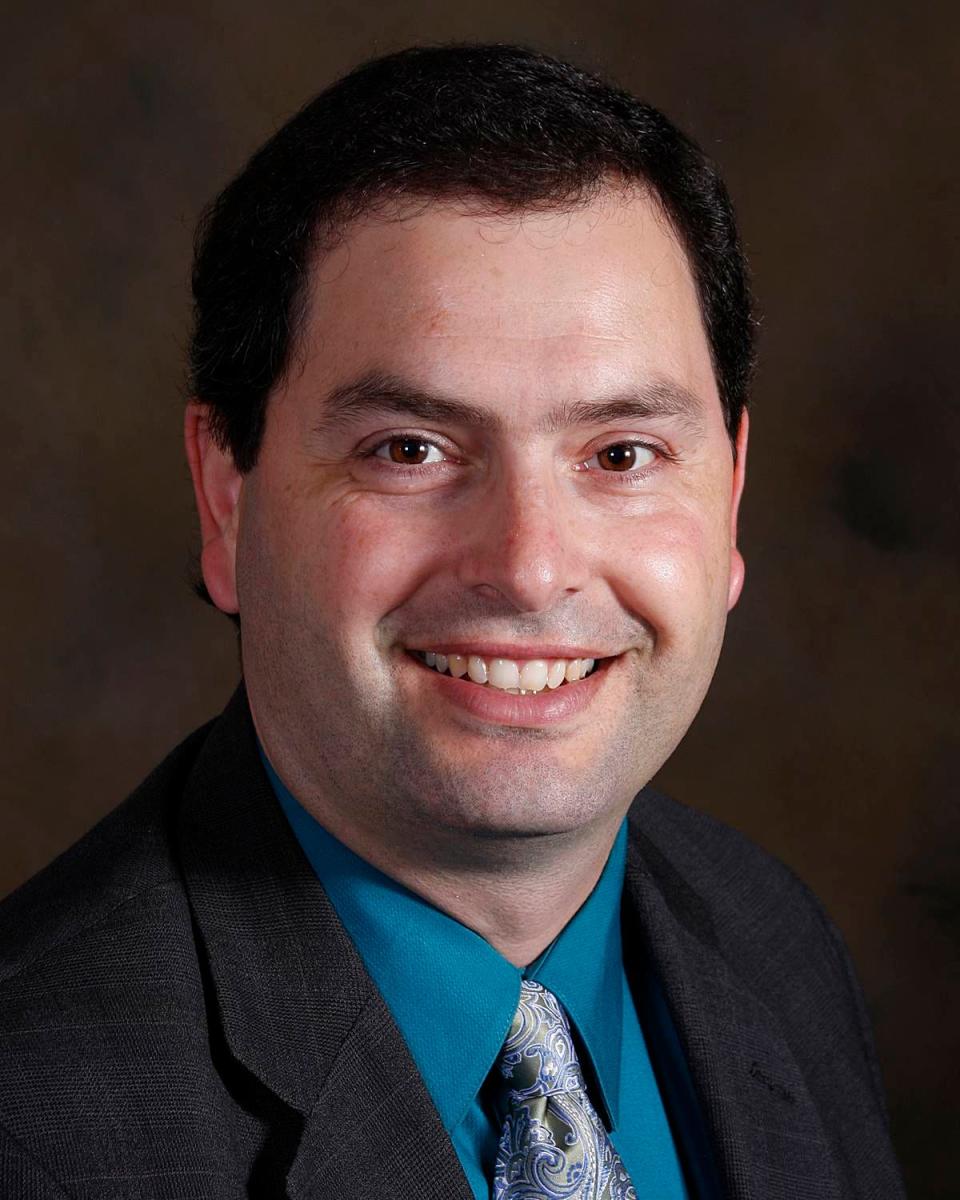3 Erie County judge candidates make their cases in race for one seat on the bench
The three lawyers are all in their early 50s and they have all been practicing law since the early 1990s. And they all have the same goal — to cap their legal careers by getting elected judge on the Erie County Court of Common Pleas.
May 16 marks the first electoral test for the three candidate, Peter Sala, Leigh Ann Orton and Eric Mikovch. Primary voters will elect as many as two of the three to advance to the Nov. 7 municipal election.
All three have cross-filed on the Democratic and Republican ballots. If one candidate wins the Democratic nomination and another wins the Republican nomination, the two will square off in November.
But the cross-filing leaves open the possibility that one of the three candidates could lock up both nominations in the primary, all but guaranteeing victory in November.
Going to the polls: Erie County voters' guide to the races, candidates and issues in the 2023 primary
Whoever wins will fill a seat on the nine-member local bench that has been vacant since May 3, 2022, when Erie County Judge Stephanie Domitrovich abruptly retired from a job she was first elected to hold in 1989. Retired judges have been handling cases since Domitrovich left her seat.
The three candidates for the one open seat have a wide range of experience. Sala and Mikovch handle criminal and civil cases, Sala as a sole practitioner based in Erie and Mikovch as a partner at the Quinn Law Firm in Erie.
Abrupt departure: Erie County Judge Domitrovich is retiring in May, with years left in term
The the third candidate, Orton, has concentrated on family law at her practice in North East.
Common Pleas Court judges in Pennsylvania are state employees who are first elected and then retained to subsequent 10-year terms. The job pays $212,495 a year — an amount set by state law — and has a mandatory retirement age of 75.

No judges on the Erie County Court of Common Pleas are up for retention this year. The last election for judge was in 2019. Sala is the only candidate in the May 16 primary who ran for judge in 2019, when he lost a five-candidate race for two open seats.
Judicial candidates in Pennsylvania are prohibited from commenting on how they might rule on specific cases. Voters are left to evaluate candidates based on their education, experience and — in the case of the candidates for Erie County judge — how their fellow lawyers rate them. The Erie County Bar Association's members ranked Sala as the most qualified of the candidates in a poll of its members released in April.
The Erie Times-News asked each of the candidates about their qualifications, experience and why they are seeking the job. Their answers are below, with the candidates listed in alphabetical order.
For additional information, the Erie County Bar Association has posted the candidates' resumes and answers to the association's questionnaire on its website, eriebar.com. The site also lists the results of the lawyers' poll.
Eric Mikovch

Party registration: Republican. Mikovch is cross-filed as a Republican and a Democrat.
Age: 54
Residence: Elk Creek Township
Experience: Member of the Quinn Law Firm in Erie since 1994. Named senior partner in 2001. He has chaired the firm's criminal defense practice department since 1998. He also handles civil cases and family law cases.
Education: University of Pittsburgh School of Law, law degree, 1994. Colgate University, Hamilton, New York, bachelor of arts degree, 1991.
Personal: Married with four children
Social media: facebook.com/eric.mikovch.1
Why do you want to be a judge on the Erie County Court of Common Pleas?
For 29 years I have been a trial lawyer. During that time, I have dedicated my career to the study and practice of law. I have represented clients in various courts more than 4,700 times in my career in 18 counties across Pennsylvania. I bring 29 years of courtroom experience to the bench, and I will be ready to go on day one.
I seek the position of judge of the Court of Common Pleas so I can put the skills I have honed to use in a different capacity, serving the people of Erie County, in the place that has always been my passion — the courtroom. I have been endorsed to be the next judge of Erie County by the Swanson Memorial FOP Lodge No. 48 of the Pennsylvania State Police. I have received this endorsement even though I have never been a prosecuting attorney.
I have also received the endorsement of retired Judge John Garhart, who served Erie County on the bench for 13 years. I believe these endorsements speak volumes as to how I have conducted myself professionally and with dignity and respect for all in the judicial system. I will use my experience, dedication and energy to serve Erie County at the highest level.
Describe the case that has had the most impact on you as a lawyer.
The case that impacted me the most occurred in 1994, my very first case ever in court, which took place three hours after I was sworn in as an attorney at the Erie County Court of Common Pleas.
I had prepared the case to do tremendous battle. I prepared my client thoroughly in the weeks leading up to the court date. I became a lawyer at approximately 11 a.m., and I walked into court at 2 p.m. When I said hello to the judge and introduced myself, he said, "Very nice to meet you Attorney Mikovch. Have you talked to the other side about resolution?"
I thought to myself, why would I do that? I believed in my client’s case. I believed in the facts and the law — why would I talk to the other side?
"No, Your Honor, I have not," I said.
At the judge’s suggestion opposing counsel and I talked for the first time, and within minutes, we were able to come to a resolution that all parties could accept. I very quickly learned that although the legal sword needs to be ready when you walk into court, it need not be used when common sense, balance and professional courtesy can be employed to achieve a similar result.
Describe any changes or innovations that you would like to bring to Common Pleas Court.
As we all know, technology is changing by the minute — if not the second. I would argue there are some changes that are helping society tremendously, while other forms of technology are hurting people from interacting with one another face to face, and not experiencing the moment.
The courtroom is very much a live, in-person venue. I believe people need to be present, so they know their issues are truly being heard and being considered thoroughly by the judge. Credibility and sincerity are best assessed in person.
As technology improves, however, parties to a court case may be able to use video teleconferencing to accomplish many of the tasks (pre-trial) that currently require personal appearances. I don’t believe a trial should ever be handled remotely, but certain motions and some legal arguments may benefit by using technology to efficiently handle the docket.
Leigh Ann Orton

Party registration: Republican. Orton is cross-filed as a Republican and a Democrat.
Age: 51
Residence: North East Township
Experience: Private practice with husband, Chris, in Orton & Orton firm, North East, since 2018. Knox Law Firm in Erie, 2009-17. Associate real estate broker in Erie, 2007-09. Private practice in own firm in Erie, 1999-2002. Law office in Memphis, Tennessee, 1995-98. Orton's practice concentrates on family law, estate planning and administration and elder law and real estate.
Education: University of Memphis, Cecil C. Humphreys School of Law, law degree, 1995. Union University, Jackson, Tennessee, bachelor of science degree in business administration.
Personal: Married with three children
Social media: ortonforjudge.com
Why do you want to be a judge on the Erie County Court of Common Pleas?
I want to put my life and work experiences to use serving the citizens of Erie County as the next judge of the Erie County Court of Common Pleas. During my 25 years of practicing law, my primary focus has been on the family. I have seen how the breakdown of the family touches every part of our judicial system, which is comprised of more than just criminal cases. I have broad experience in the areas of the law that are most frequently litigated in our court system, and I am ready to hear those types of cases beginning on day one.
My goal is to have a positive impact upon the lives of those who come before me while upholding the rule of law. I understand how important it is for individuals to have their day in court. For many individuals, it is one of the most important days of their lives and may have lasting effects on them, their families and their children. I will treat all litigants and attorneys with the dignity and respect that they deserve. I have the knowledge, experience and judicial temperament necessary to serve the citizens of Erie County as a judge of the Court of Common Pleas, and I look forward to serving in that position.
Describe the case that has had the most impact on you as a lawyer.
A case that had the most impact on me as a lawyer was a custody matter in another county in Pennsylvania wherein a conciliator changed primary custody of a child from the father to the mother and allowed the mother to relocate the child with her out of state.
I represented the father who had to wait three months before the matter could be heard by a judge. The conciliator’s failure to follow statutory authority regarding child custody had a significant negative impact on both the father and the child. The child was taken away from her father, school, extended family and friends, and moved to another state where she knew no one except her previously estranged mother.
After a custody trial, the judge ordered that the child be returned to her father in Erie County. Reuniting the child with her father was one of the most rewarding results I have achieved in my legal career.
Describe any changes or innovations that you would like to bring to Common Pleas Court.
I will treat all litigants and attorneys with dignity, respect, fairness and impartiality, regardless of race, gender, ethnicity, disability, age, sexuality or economic status. I understand the desire of litigants to have their case heard as soon as possible. As judge I will attempt to move cases through the court system in a timely manner.
I will encourage mediation where appropriate, and I will make timely decisions. I will do everything that I can to make justice equal for all citizens of Erie County. I will appoint attorneys to represent defendants whenever possible; encourage our local bar to increase pro bono services for those who are indigent, elderly, veterans or living with disabilities; promote the simplification of our legal system and access to technology; and support organizations that promote equal access to the justice system.
Peter Sala

Party registration: Democrat. Sala is cross-filed as a Democrat and a Republican.
Age: 54
Residence: City of Erie
Experience: Private practice in own firm since 1995, handling civil, criminal and family law cases. Solicitor for the Erie County Sheriff's Office since 1997. Co-solicitor for the Erie County clerk of records since 1997. Law clerk in Erie County Court of Common Pleas, 1994-1995.
Education: Cleveland-Marshall College of Law, law degree, 1994. Gannon University, bachelor of arts degree, political science/social science, 1991.
Personal: Married with three children
Social media: salaforjudge.com
Why do you want to be a judge on the Erie County Court of Common Pleas?
I decided to run for Erie County judge for the same reason I became a lawyer, to help people.
As I traveled around the state on various cases, I became aware of the need for good judges with the dedication and experience necessary to understand and resolve them properly. I have always worked hard for the people I represent and will bring that same work ethic to the bench.
When that is combined with my extensive appellate experience before the Commonwealth Court, the Superior Court and the Pennsylvania Supreme Court, I will be able to help even more people with their legal dilemmas.
Describe the case that has had the most impact on you as a lawyer.
The case that had the most impact upon me as a lawyer was the case I briefed and argued before the Pennsylvania Supreme Court which was decided in July of 2020.
That case eliminated the use of only hearsay evidence at preliminary hearings as the sole basis for holding the case for trial. It not only applied to Erie County cases but also to every case in Pennsylvania.
I had been arguing that issue for over 15 years and never gave up. The Supreme Court finally accepted the case and agreed that due process required more than simply hearsay evidence. That case taught me the value of perseverance and to never give up.
Describe any changes or innovations that you would like to bring to Common Pleas Court.
When I was a young lawyer in 1994 working for the Erie County Court of Common Pleas, we used to have days dedicated to civil arguments in an effort to move cases toward final resolution. They were called argument days.
Every 15 minutes or half an hour, depending on the case, the judge would hear arguments on various motions and then rule on them right away. The feedback from lawyers was favorable in that it moved the cases along instead of having them linger for months.
In family law cases, mediation and collaborative law is being used more to promote family harmony amidst difficult circumstances.
In the criminal arena, the backlog of cases from COVID-19 is subsiding as they are now regularly scheduled for trial again. The continued use of ARD (accelerated rehabilitative disposition), treatment court and veterans' court should be pursued whenever possible.
Otherwise, I would make myself available to help in any area that the other members of the bench feel it is needed most.
Contact Ed Palattella at epalattella@timesnews.com. Follow him on Twitter @ETNpalattella.
This article originally appeared on Erie Times-News: 3 Erie County judge candidates campaign on qualifications, experience

